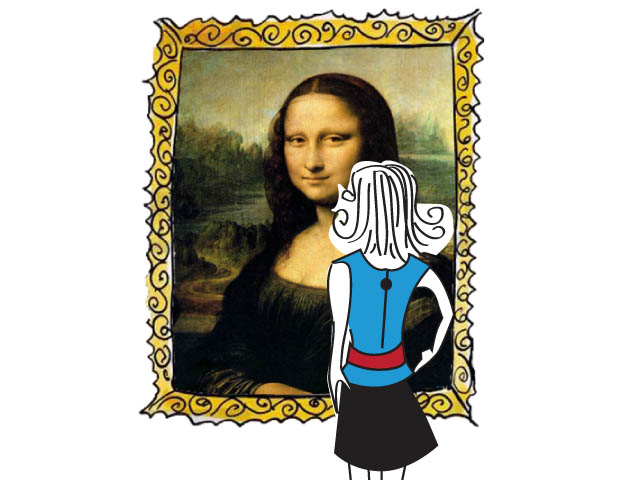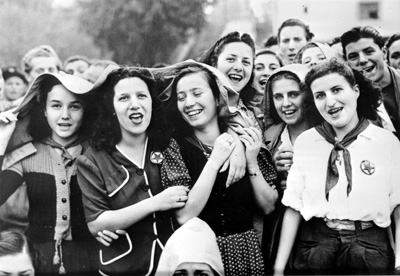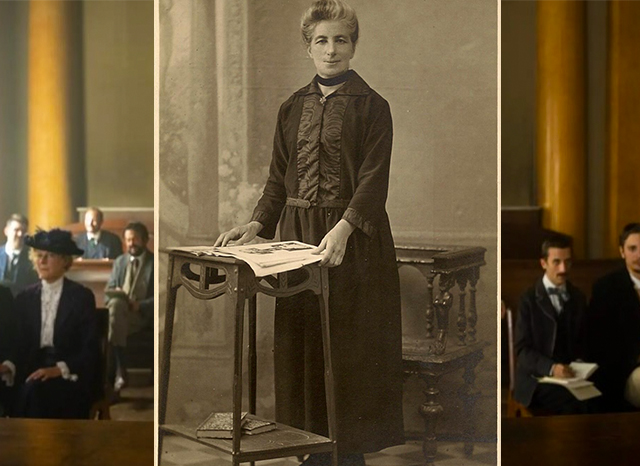
Festeggiando il giorno internazionale
di donne e Lidia Poët
— prima avvocatessa italiana.
Celebrating International Women’s Day and Lidia Poët
— Italy’s first female lawyer.
Avvocata. Avvocatessa. C’è ancora una disputa sul nome, anche se Crusca ha determinato: “avvocata” per essere corretto, quindi usa il termine che preferisci.
Avvocata. Avvocatessa. There is still a dispute about the name, even if Crusca has determined: “avvocata” to be correct, so use the term that you prefer.
Chi era Lidia Poët?
Who was Lidia Poët?

Nata nel 1855 in una famiglia benestante della zona di Pinerolo, era la più giovane di quattro fratelli e tre sorelle. A tredici anni, bionda, bella e di talento, ha detto a suo padre che voleva andare a scuola come i suoi fratelli. Una volta che ha avuto la possibilità di studiare, voleva di più. Dopo la morte del padre, convinse la madre, ora vedova, a permetterle di studiare per la sua “Maturità al Liceo.” Laureata, si iscrive all’Università di Torino, Facoltà di Giurisprudenza.
Born in 1855 into a wealthy family in the Pinerolo area, she was the youngest of four brothers and three sisters. At thirteen, blond, beautiful, and talented, she told her father she wished to attend high school like her brothers. Once she had a taste of education, she wanted more. After her father’s death, she convinced her mother, now a widow, to allow her to study for her “maturità al liceo.” Once she obtained her degree, she enrolled in the University of Turin, Faculty of Law.
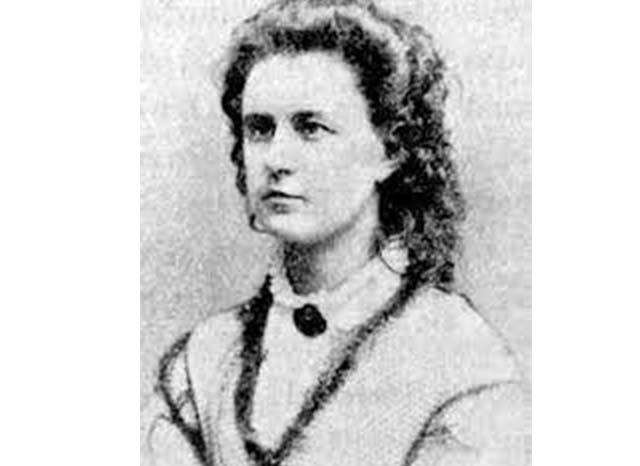
Il 17 giugno 1881, Poët ricevette la laurea in legge da quell’istituzione, scrivendo una tesi sullo status delle donne nella società e sul diritto di voto delle donne. Dopo la scuola di legge, si è formata in uno studio legale. Dopo aver superato l’esame pratico dell’Ordine degli Avvocati di Torino nel 1883, Lidia Poët viene iscritta all’albo e diviene la prima donna italiana ammessa all’esercizio della professione forense.
On June 17, 1881, Poët received her law degree from that institution, writing a thesis on women’s status in society and women’s right to vote. After law school, she trained in a legal studio. When she passed the practical examination of the Order of Advocates of Turin in 1883, Lidia Poët was inscribed in the roll of lawyers — l’albo degli avvocati — and became the first Italian woman admitted to the practice of law.
Lidia ha dovuto affrontare importanti ostacoli per arrivare a questo punto, e la sua abilità e intelligenza le ha guadagnato il diritto di esercitare la professione legale in Italia. Sembrava che avesse vinto una vittoria significativa per se stessa e per altre donne – ed era un nuovo giorno per l’emancipazione delle donne.
Lidia faced significant roadblocks to arrive at this point, and her skill and intelligence earned her the right to practice law in Italy. It seemed she had won a significant victory for herself and other women — and it was a new day and age for women’s empowerment.
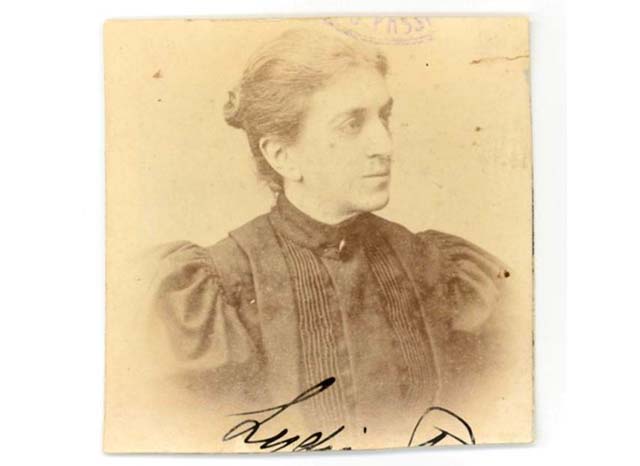
Il nuovo status di avvocato di Poët non passò inosservato e causò piuttosto un certo scalpore. Due avvocati, incensato che una donna era stata ammessa nella legge, in segno di protesta si dimise dal bar. Ma secondo il presidente Xavier Francesco Vegezzi e altri quattro consiglieri, “secondo le leggi civili italiane, le donne sono cittadini come gli uomini” e avevano tutto il diritto di praticare la legge.
Poët’s new status as a lawyer did not go unnoticed and rather caused quite a stir. Two lawyers, incensed that a woman had been admitted into the law profession, in protest resigned from the bar. But according to President Xavier Francesco Vegezzi and four other councilors, “under Italian civil laws, women are citizens like men” and had every right to practice law.
Tuttavia, la vittoria di Poët fu breve e dopo tre mesi fu radiato dall’albo. Gli uomini in posizioni di potere erano pronti e disposti a distruggere il successo di Lydia, quindi ancora una volta bloccando il movimento femminile.
However, Poët’s victory was short-lived, and after three months, she was disbarred. Men in positions of power were ready and eager to squash Lidia’s success, thus again setting back the women’s movement.

Cosa è successo? Perché Lidia è stata radiata?
What happened? Why was Lidia disbarred?
L’iscrizione di una donna nella professione degli avvocati “non piacque” all’Ufficio del Procuratore Generale del Re, Giuseppe Moggi. Il 6 settembre 1883 presentò una denuncia presso la Corte d’Appello di Torino, contestando la registrazione nel Registro della Poët a presso la Corte d’Appello di Torino. Nonostante le repliche, gli argomenti e gli esempi di avvocati donne in altri paesi, il procuratore generale ha sostenuto che dovrebbe essere vietato dalla legge e dall’ordine pubblico per le donne di entrare nella Milizia togata – la professione del diritto. Sosteneva che, mentre le donne potevano essere insegnanti o dottori, non potevano essere avvocati – credendo che fosse troppo arduo per la genere femminile.
The inscription of a woman on the roll of lawyers “did not please” the Office of the King’s Attorney General, Giuseppe Moggi. On September 6, 1883, he entered a complaint with the Court of Appeal of Turin, challenging the registration in the Register of Poët before the Court of Appeal of Turin. Despite rejoinders, arguments, and examples of women lawyers in other countries, the attorney general argued that it should be forbidden by law and public policy for women to enter the milizia togata — the profession of law. He claimed that while women could be teachers or doctors, they could not be lawyers — believing it was far too arduous for the female gender.
Lidia è stata tenace e non si è tirata indietro.
Lidia was tenacious and did not back down.
Utilizzando il suo intelletto e ragionamento equilibrato, e con il sostegno della maggior parte dei giornali italiani, ha fatto appello alla Corte Suprema di Cassazione, la più alta corte d’appello o “la corte di ultima istanza in Italia.” Tuttavia, il tribunale maschile lo respinse categoricamente e la decisione del tribunale inferiore fu confermata. Le fu detto che non poteva esercitare la professione legale, ma poteva mantenere il titolo di Miss Lidia Poët, una laureata in legge, e le fu detto che doveva ancora pagare “spese legali” per continuare ad avere questo titolo.
Using her intellect and level-headed reasoning, and with the support of most Italian newspapers, she appealed to the Supreme Court of Cassation, the highest court of appeal or “the court of last resort in Italy.” However, the male-dominated court flatly turned her down, and the lower court’s decision was confirmed and upheld. She was told she could not practice law but could retain the title Miss Lidia Poët, a law graduate, and was told she still had to pay “legal fees” to continue to have this title.
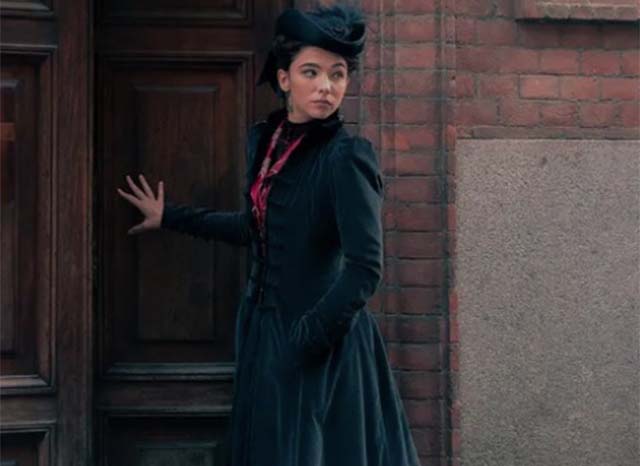
Devastata ma non sconfitta, Lidia si insinua con astuzia nello studio del fratello. Lì lavorò come avvocato, come aveva studiato e addestrato a fare. E anche se non poteva firmare lettere o supplicare in tribunale, è diventata una forza trainante dello studio. Quando suo fratello partiva per Vichy ogni anno, assumeva pienamente la pratica e, quando necessario, cercava colleghi maschi per appellarsi in tribunale a nome dei suoi clienti.
Devastated but not defeated, Lidia cleverly insinuated herself into her brother’s law office. There she worked as an advocate, as she had studied and trained to do. And even though she could not sign letters or plead in court, she became a driving force of the firm. When her brother departed for Vichy each year, she took over the practice entirely and, when necessary, sought out male colleagues to plead in court on behalf of her clients.
Tutti i giorni lei era al suo posto di lavoro, elegante, sorridente, disponibile, piena di entusiasmo. I clienti la adoravano. Settimana dopo settimana, mese dopo mese, consultando codici e scrivendo con la bella penna d’oro, la signorina Poët esercitava di fatto l’avvocatura, ma dietro le quinte, senza un titolo, senza un riconoscimento ufficiale, «redigendo atti e pareri che non poteva firmare per cause che non poteva discutere». [Iodonna.it]
She was elegant, smiling, helpful, and enthusiastic at her workplace every day. Customers loved her. Week after week, month after month, consulting codes and writing with the beautiful golden pen, Miss Poët practiced law, but behind the scenes, without a title, without official recognition, “drafting acts and opinions that she could not sign for causes that she could not litigate in the courts.” [Iodonna.it]
Trentasei anni dopo…
Thirty-six years later…
Fu solo nel 1919 che le donne in Italia furono autorizzate a ricoprire certi incarichi pubblici e vennero concessi maggiori privilegi economici e sociali. Come risultato, un anno dopo, nel 1920, all’età di 65 anni, Lidia Poët fu arruolata nuovamente negli archivi dei membri del Consiglio degli avvocati e ufficialmente riconosciuta come avvocato.
It wasn’t until 1919 that women in Italy were allowed to hold certain public offices and were granted more economic and social privileges. As a result, a year later, in 1920, at age 65, Lidia Poët was re-enlisted in the record of the members of the Council of lawyers and officially recognized as a lawyer.
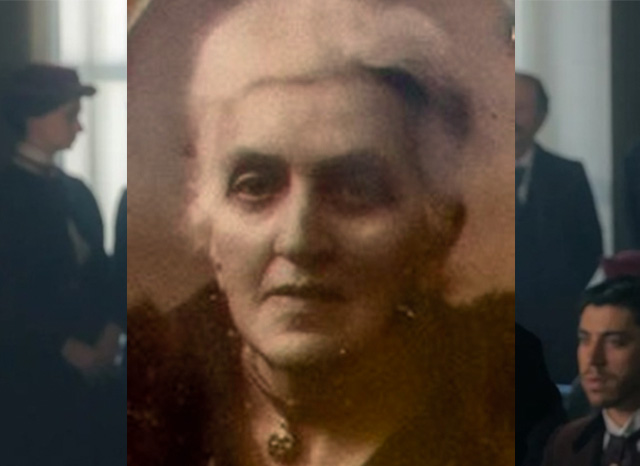
Lidia Poët è stata impegnata in cause femministe per tutta la sua vita. Divenne uno dei primi membri quando il Consiglio Nazionale delle Donne Italiane (Consiglio Nazionale delle Donne Italiane) fu fondato nel 1903. Lidia era particolarmente impegnata nella difesa dei diritti dei bambini, degli emarginati e delle donne e sosteneva il suffragio femminile. Poët non si sposò mai, non ebbe figli e morì nel 1949 a 94 anni.
Lidia Poët was dedicated to feminist causes throughout her life. She became one of the first members when the Consiglio Nazionale delle Donne Italiane (the National Council of Italian Women) was founded in 1903. Lidia was especially committed to defending children’s rights, the marginalized, and women and advocated for women’s suffrage. Poët never married, did not have children, and passed away in 1949 at 94.
Incuriosito da Lidia Poët?
Intrigued by Lidia Poët?
Vuoi saperne di più su questa donna pioniere? Non ci sono biografie full-length di lei attualmente esistono in inglese. Tuttavia, se parli correntemente italiano, puoi leggere il libro scritto da Chiara Viale: Lidia e le altre. Pari opportunità ieri e Oggi: l’eredità di Lidia Poët
Want to learn more about this trailblazing woman? There are no full-length biographies of her currently exist in English. Still, if you’re fluent in Italian, you can read Chiara Viale’s Lidia e le altre. Pari opportunità ieri e oggi: l’eredità di Lidia Poët (Lydia and the others. Equal opportunities yesterday and today: the legacy of Lidia Poët).
Approfondisci la vita e i tempi di Lidia Poët in un nuovo dramma contemporaneo di Netflix.
Delve more into the life and times of Lidia Poët
in a new contemporary Netflix drama.
Ora in streaming su Netflix è una nuova serie drammatica dal titolo “La legge secondo Lidia Poët”, interpretato da Matilda de Angelis nel ruolo principale di Lidia. Lo spettacolo è liberamente basato sulla carriera iniziale dell’avvocato italiano e le difficoltà che ha affrontato. Si concentra anche su complicati casi legali in cui persone innocenti vengono diffamate e condannate dall’opinione pubblica prima di raggiungere un tribunale. Le buffonate e il lavoro investigativo in cui Lidia si indulge per salvare i suoi clienti sono principalmente romanticizzati per il dramma televisivo.
Now streaming on Netflix is a new dramatic series entitled “The Law According to Lidia Poët,” starring Matilda de Angelis in the title role of Lidia. The show is loosely based on the early career of the Italian lawyer and the difficulties she faced. It also focuses on complicated legal cases in which innocent people are defamed and convicted by public opinion before reaching a courtroom. The antics and detective work Lidia indulges in to save her clients are primarily romanticized for TV drama.

Secondo Marilena Jahier Togliatti, l’unico parente vivente – una nipote lontana dell’avvocato, la mostra di Netflix è “troppo romanzata” per il suo gradimento. Lei pensa: “Che bisogno c’era di cambiare la storia? Lei [Lidia] era già abbastanza avventurosa da rimanere fedele alla realtà.”
According to Marilena Jahier Togliatti, the only living relative — a distant grand-niece of the lawyer, the Netflix show is “too fictionalized” for her liking. She thinks, “What was the need to twist history? She [Lidia] was already adventurous enough to stay true to reality.”
Ho visto tutti e sei gli episodi della prima stagione e l’ho trovato divertente e ben fatto. Può essere un pezzo drammatico sensazionalistico, ma una delle cose che fa eccezionalmente bene è far luce sul nome di Lidia Poët, rendendolo e le sue reali realizzazioni conosciute da una nuova generazione.
I’ve watched all six episodes of the first season and found it entertaining and well done. It may be a sensationalized drama piece, but one of the things it does exceptionally well is shine light on Lidia Poët’s name, making it and her actual accomplishments known to a new generation.
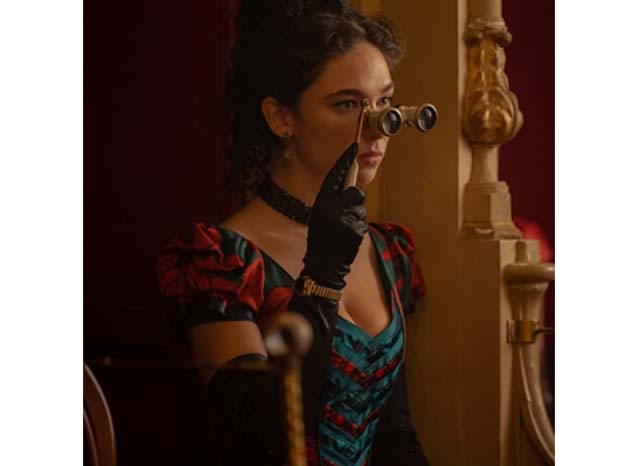
Cosa non c’è di piacere di un
dramma italiano ambientato a Torino?
What’s not to like about an Italian Netflix drama set in Turin?
La produzione di Netflix è girata a Torino, e i set e le scene sono incantevoli, ma i ladri di scena sono i costumi degli attori. Il costumista Stefano Ciammitti, un allievo del cliente italiano leggendario Piero Tosi, ha generato i intrugli ricamati sontuosi della seta e del velluto per i suoi cavi femminili e maschii. Colori cremisi e verde acqua, abiti su misura abbinati a cappelli intelligenti, bottoni avorio, cinture di pelle, deliziose spille d’oro e orecchini nelle forme di api e insetti.
The Netflix production is filmed in Turin, and the sets and scenes are lovely, but the scene stealers are the actors’ costumes. Costumer Stefano Ciammitti, a pupil of legendary Italian costumer Piero Tosi, has created sumptuous velvet and silk embroidered concoctions for his female and male leads. Crimson and teal colors, bespoke dresses paired with smart hats, ivory buttons, leather belts, delicious gold pins, and earrings shaped like bees and insects.
Do allo show due pollici in su e spero che ci sarà una seconda stagione. In attesa di conferma da Netflix con fiato sospeso.
I give the show two thumbs up and hope there will be a second season. Waiting for confirmation from Netflix with bated breath.
Torniamo a parlare della
giornata mondiale della donna!
Turning our thoughts back to International Women’s Day!
Chi meglio evidenziare il 8 marzo 2023
la Giornata internazionale della donna, di Lidia Poët?
Who better highlight on March 8, 2023
on International Women’s Day, than Lidia Poët?

Discutendo e celebrando Lidia Poët, che si tratti della vera donna o del nuovo dramma cinematografico vagamente basato sulla sua vita in occasione della Giornata internazionale della donna, riconosciamo il contributo di questa avvocatessa ferocemente indipendente al progresso dell’uguaglianza di genere e dei diritti delle donne. I risultati di Lidia Poët contribuiscono a sensibilizzare l’opinione pubblica sull’importanza dell’uguaglianza di genere e dell’empowerment delle donne, cosa che anche nel 2023 deve ancora essere affrontata.
By discussing and celebrating Lidia Poët, whether the actual lady or the new film drama loosely based on her life on International Women’s Day, we recognize this fiercely independent female lawyer’s contribution to advancing gender equality and women’s rights. Lidia Poët’s achievements help to raise awareness of the importance of gender equality and women’s empowerment, something that even in 2023 is something that still needs to be addressed.
